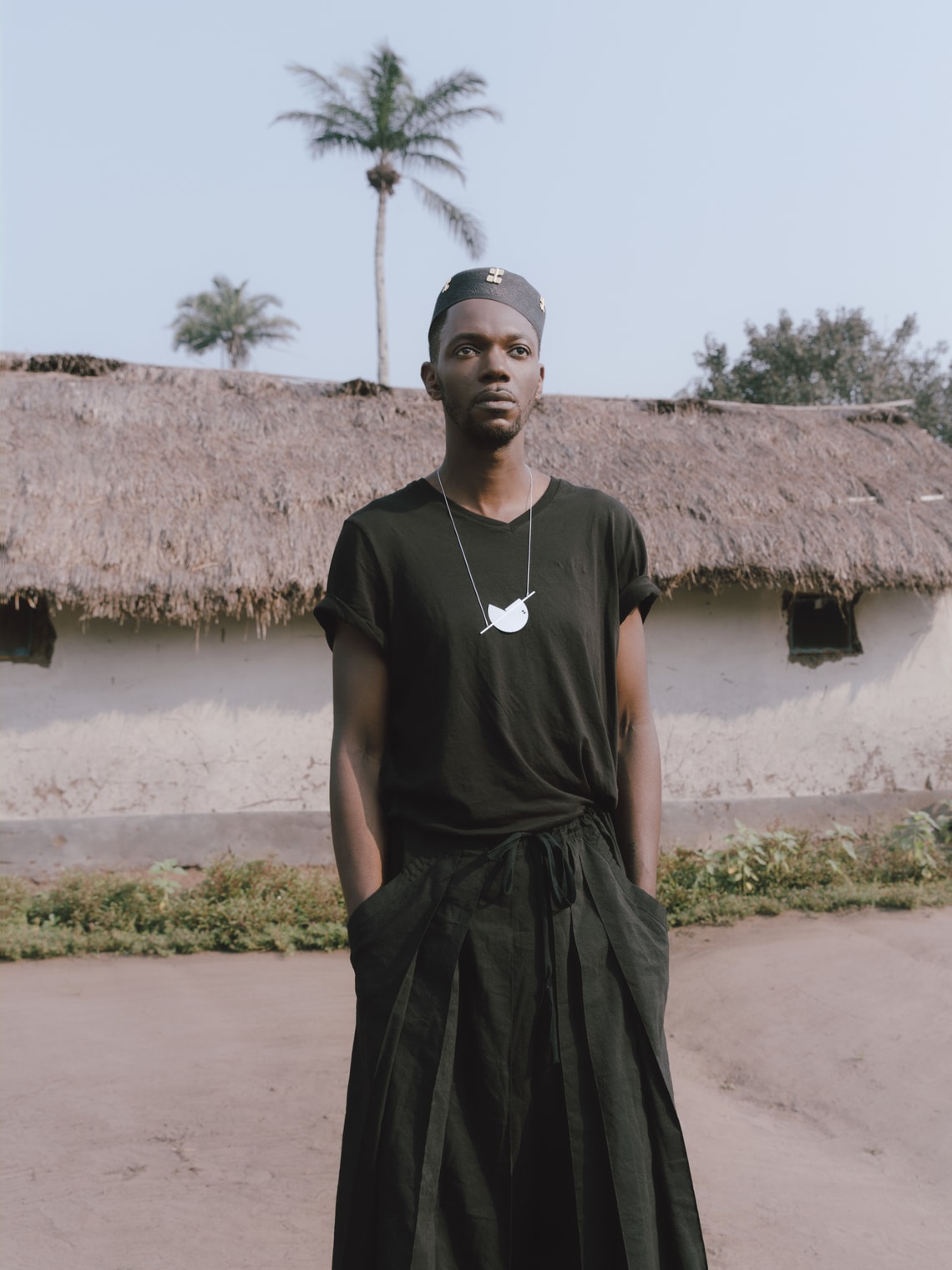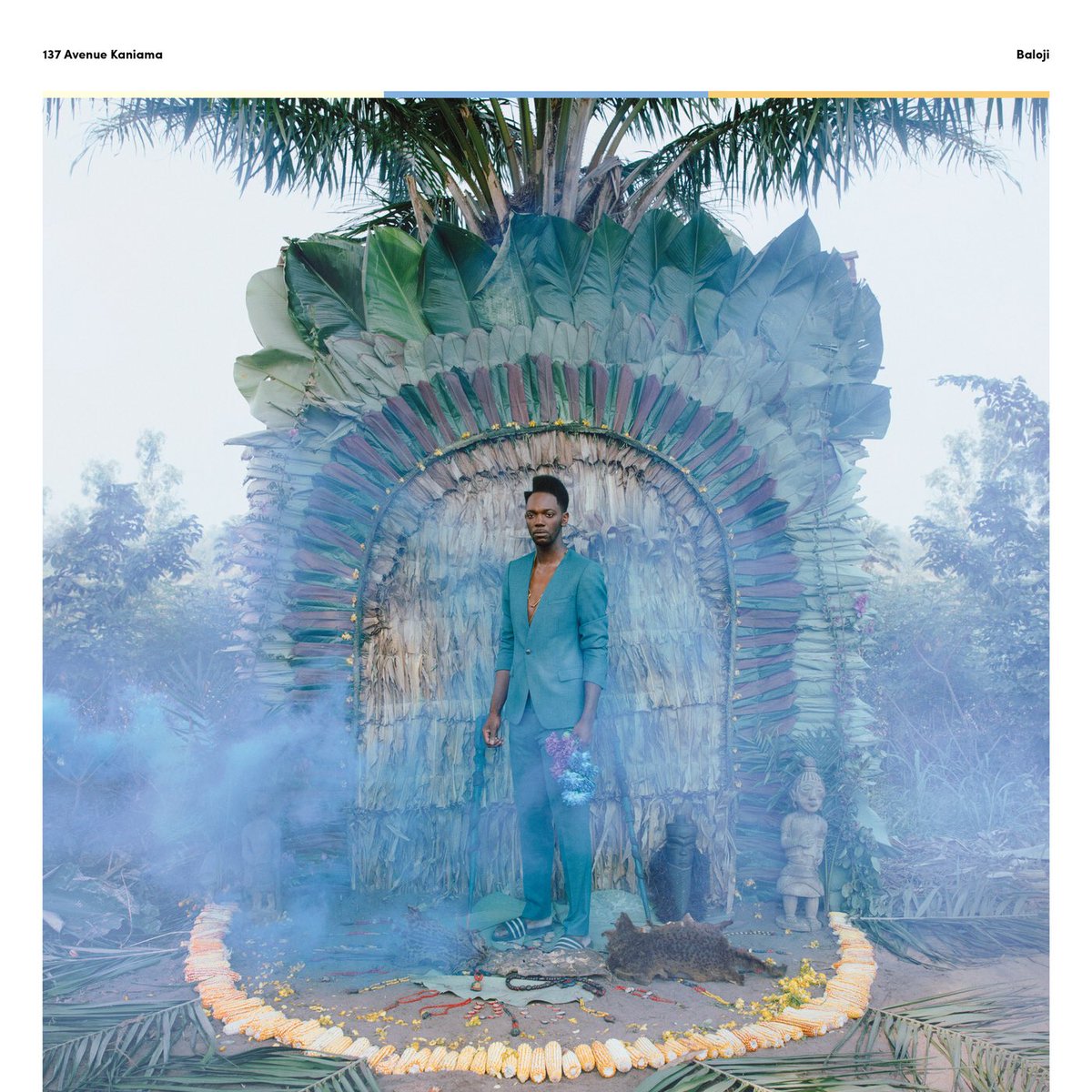
Venture down 137 Avenue Kaniama and you will not come out unscathed. The album title is a nod to the street in Lubumbashi, in the Democratic Republic of Congo, where the Belgian rapper was born just about forty years ago. It is a resolutely hip hop album, in its production as well as in its poetic and political musings, and is coming out as one of spring’s top releases.
As questioned in “La dernière pluie-Inconnue à cette adresse,” (The Last Rain – Unknown at This Address), is the fantastical music of Baloji “too black for the whites and too white for the blacks”? Regardless, it is definitely hip hop; the mixing of genres makes this evident. From a slow boil to a furious bubbling of sound, Baloji arranges the album with impressive authority. The strings of James Underwood’s violin (Vampire Weekend, The XX) accompany the rumba (“Bipolaire-Les Noirs”), Trap brushes up against Bikutsi (“Ensemble (Wesh)”), and electronic music and Afrobeat alike are called upon to complete the talented artist’s musical flow.
Baloji, who writes his own songs, is above all a poet. He is also a rapper, an amateur sampler, and a talented storyteller. Moreover, he designed 137 Kaniama Avenue as one long take. His 14 tracks, partly autobiographical — or to put it otherwise, his 14 cathartic tracks — are riddled with fake film dialogue as well as real cinematographic references, from Jean-Luc Godard to Michel Gondry.
It’s not surprising, since Baloji is also videographer. For the release of his first album, Hotel Impala, 10 years ago, he made all of his own music videos: “[I did it] rather out of necessity, at first, because there was no one to do them… and then I got caught up in the game. For me, aesthetics is a way to make the subject believable. The image is at the service of the song.”

Baloji has just made his first short film, KANIAMA SHOW, to accompany the release of his new album. He hopes to be able to show it in Congo:
“It is a satire of television propaganda in the Congo and more broadly soft power. In our societies, we continue to think that if it’s said on TV, it’s true… I’ve studied a lot of TV shows and the set I created for the film is a mix of Michel Drucker’s, of Rai Uno’s Sunday afternoon set and of Soul Train.”
The “Soleil de Volt” (Electric Sun) video is an extract from this 30-minute film. Eriq Ebouaney, who previously played Lumumba in Raoul Peck’s film of the same name, plays the TV presenter. Serge Aimé Coulibaly choreographed the video.
“Soleil de Volt” reprises, in its own way, “Dooyo,” a song by the Dur Dur Band, a Somali group from the 80s. Baloji states that behind the “groove assassin” sound hides the reality of the Lubumbashi inhabitants “living in provincial towns with alternating current and palliative care.”
“Le monde est à portée de souris
The world is a mouse click away
Mais y a pas de jus
But there is no juice
Tous surveillés par des cookies
All monitored by cookies
Mais y a pas de jus…
But there is no juice…
Big browser, big data
Big browser, big data
C’est l’alpha et l’omerta
It’s alpha and omerta
Le président a fermé le robinet
The president has shut the tap
L’accès à la 3G
Access to 3G
Délestage prolongé…
Extended downloading…
la nuit est rallongée”
the night is extended
(Soleil de Volt)
This “Overseas Congolese” as he likes to define himself, especially on “Hiver Indien” (“Indian Winter”), which is by the way the soundtrack of the video game FIFA 18, continues to take a critical look at the country’s affairs and even, more widely, at the current state of the African continent. The masterful final title “Tanganyika,” is a testament to his critical positioning.
“Tanganyika” reveals the voice of counter-tenor Serge Katudji as well as a choir set up around bassist and choirmaster, Didier Likeng. A veritable requiem, this 11 minute track covers the dramatic situation in this southeastern province of the DRC. Accompanied by UN soldiers, Baloji and his orchestra performed in the city of Goma, a region which has suffered the most violence. Speaking about the performance, Baloji has said to have left his heart there.
“À raison, les anciens disent malheur aux vainqueurs
Rightly, the elders say bad luck to the winners
C’est pourquoi les insurgés pactisent avec l’envahisseur
That’s why the insurgents make a deal with the invader
Les rescapés sont des ombres sans gloire
The survivors are shadows without glory
Ils ont vendu leurs armes au diable, au maquis noir
They sold their weapons to the devil, to the black jungle
Ils dealent avec la culpabilité des survivants
They deal with the guilt of the survivors
Comme autant de témoins encombrants”
Just like the many unwieldy witnesses
(Tanganyika)
“Tropisme – Start-up” is, according to Baloji, a true account of African affairs, with Afrobeat flavor. He credits Antibalas, a group from Brooklyn inspired by Fela Kuti, with influencing the track: “This is one of the tracks I prefer. It was inspired by the situation in southern Sudan and how we see these issues in other countries, in northern Cameroon for example, or in my region, Katanga, with its separatist aspiration. It’s just like what is happening with the Catalans or the Belgians.”

In this multi-lingual album (with lyrics in English, French, Lingala and Swahili), there is also a tendency to mix styles and moods, and the references to Fela Kuti are not lacking. They even set the tone, from the get-go, with “Glossine (Zombie)”. On this title, the father of Afrobeat targets the military who blindly obey orders. Baloji points to the resignation of his contemporaries:
“Tu dors debout, tu dors debout
You sleep standing, you sleep standing
Tout paraît flou, tout paraît flou
Everything seems blurry, everything seems blurry
C’est la maladie du sommeil
It’s the sleep sickness
Les frères sont en mode veille
The brothers are in sleep mode
Ils se demandent comment voir plus loin
They wonder how to see beyond
Que le bout de son joint…”
The end of their joint…
(Glossine (Zombie))
Baloji, who does not understand this “attitude of submission,” calls upon La Boétie, to drive home his point: “Voluntary servitude, you sleep with your eyes open”. These words are asserted by a choice narrator, Congolese author Jean Bofane, who appears throughout the album.
On the title “Bipolaire – Les Noirs, » (Bipolar – The Blacks), Baloji, with his deep voice, appropriates the title of Haitian writer Danny Lafferière’s book and questions: “How to make love to a negro without getting tired?” His response: “You need to conquer him, you need to immobilize him.”
Baloji dedicates this track to Universal Africa, the label on which he first released his last EP in 2015, 64bits & malachite. He addresses his ex-boss, Vincent Bolloré, in a statement reminiscent of a bitter divorce: “Because we’re eating out on your expense account, you think I’m at your service.” (Baloji is now signed with Bella Union.)

Following this anti-love letter is “Passat and Bovary” — a comic song and tribute to one of his self-proclaimed ultimate musical references, Jacques Brel. Speaking to a modern version of Flaubert’s character, the “faithful lady despite her wavering heart,” he speaks of his experience: “I fell in love with a woman who was already engaged. At the time, I drove an old, ghetto Passat!”
“Cette vieille Allemande sera notre chapelle ardente
This old German car will be our fiery chapel
Repeinte avec tes lettres d’adolescente
Repainted by your teenage letters
Tu peux rassurer ton mari…
You can reassure your husband …
J’ai fait qu’entamer les préliminaires pour lui”
I only started the foreplay for him
(Passat & Bovary)
Adultery, heartbreak, and failed romantic relationships are at the heart of the new project by the man who “brings a pen to the wound,” who speaks to difficult, painful situations. (See track “Ciel d’encre”)
“Love and relationships are central to the record. This sequence starts with the song “Ciel d’encre” (translation: Ink-Black Sky) where I discuss the separation with the mother of my daughter and all that it implies, including the way of losing yourself in something carnal… I speak about that in the following track “Peau De Chagrin-Bleu de Nuit” (translation: The Magic Skin – Blue of the Night).
Baloji was inspired by the title “I Belong to You,” by Lenny Kravitz, an artist who he came to appreciate for the latter’s alternative, underground style. The lyrics that speak to carnal love also evoke the climactic moment that is called, in French, “la petite mort” (Editor’s note: the translation is “little death” and is a popular reference for sexual orgasm, as likened to death). “I had a lot of fun writing this text. No pun intended, but it was pretty pleasurable! This track speaks to a post-coital melancholy, to the feeling of vulnerability that we rarely talk about because it makes everyone feel uncomfortable.”
Baloji really bares it all on this new album. The climax comes with “La dernière pluie-Inconnu à cette adresse” (The Last Rain-Unknown at this Address) that echoes “Entre les lignes” (Between the Lines) from his debut album. It summarizes the trials and tribulations of a life defined by separations and restless wanderings. It’s a shocking piece, both for its painful lucidity and its furious combativeness:
“Car si la vie est courte, elle ne sera pas petite
Because if life is short, it will not be small
Au bord de la faillite comme au pied de la réussite
On the verge of bankruptcy, also at the foot of success
Là où ils entendent le tic-tac de l’horloge,
Where they hear the ticking of the clock,
la cocotte-minute
the pressure cooker
Moi j’entends le snare qui percute, qui bute,
I hear the snare that hits, that stumbles,
et ça fait…”
and that makes…
(La dernière pluie)
In this same song, which Baloji brands as one of his most honest, he announces that it’s his last album:
“Pendant qu’ils courent la gloire, je cours le risque
As they run the glory, I run the risk
La suite d’Hôtel Impala sera mon dernier disque”
The Impala Hotel Suite will be my last record
According to him, the economic model is not viable, particularly because of the importance he attaches to the image: “For me, it is a real extension of the music. But we live in a world where people do not understand that. I love the expression of American singer Azealia Banks, ‘broke with expensive taste.’ I think that defines me pretty well!”
Crossing our fingers that a successful release of this gem of an album will change Baloji’s mind, because, as he said while quoting French philosopher Henri Bergson, “The future is not what happens but what we are going to do.”
From March 24th onward, Baloji, who won the “Best Concert” award last January at the RTBF D6Bels Music Awards (Belgian awards ceremony), will be travelling the globe, from Japan to Germany, passing through France. Baloji is at Les Etoiles in Paris, March 30th, and at Metronum in Toulouse, April 4th.
